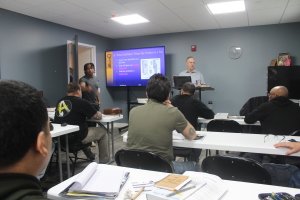Survey: Millennials' Religious Unaffiliation Similar at Faith-Based and Public Colleges
WASHINGTON – Millennials enrolled in religious colleges are just as likely to leave the religious affiliation of their childhood as students enrolled at public universities, a new survey found.
"Among Millennials who have attended or are attending a religiously-affiliated college or university, only 5 percent were raised unaffiliated and 16 percent currently describe themselves as unaffiliated," said Dr. Robert P. Jones, CEO of Public Religion Research Institute, to The Christian Post about his survey, which was presented at Georgetown University on Thursday.
"This suggests that they are about as likely to switch to become unaffiliated as Millennials overall."
The 2012 Millennial Values Survey was coauthored by Jones; Dr. Thomas Banchoff, director of Georgetown University's Berkley Center for Religion, Peace & World Affairs; and Daniel Cox, research director for PRRI.
It found that there was significant movement in the religious affiliation of a Millennial's childhood to his/her current affiliation, with the largest religious growth in the "unaffiliated" category, as it increased from 11 percent in childhood to 25 percent currently, a 14-point increase. The Catholic category saw the greatest loss, from 28 percent in childhood to 20.0 percent at present, or a near 8-point decline in Catholic affiliation.
According to Jones, while there is a correlation between level of education and an increased percentage of those who identify as unaffiliated, he stressed that "correlation is not causation."
"There is a positive correlation between higher education levels and being religiously unaffiliated," said Jones, who also noted that unaffiliated does not necessarily mean atheist, as many respondents who considered themselves unaffiliated still believed in God.
"We can't infer from this that attending college makes one more likely to be unaffiliated. It is just as likely that the unaffiliated are more likely to complete a B.S. degree because of other factors," he said.
Overall, college-age Millennials are more likely than the general population to be religiously unaffiliated. They also hold less orthodox religious beliefs, with less than one-quarter (23 percent) believing that the Bible is the word of God and should be understood literally, and about one-quarter (26 percent) believing the Bible is the word of God, but not everything should be taken literally. And 37 percent of college-age Millennials believe the Bible is written by men and not the word of God.
In addition to the researchers Jones, Banchoff, and Cox, Abigail Clauhs, member of the Interfaith Council at Boston University, was the fourth person on the panel and presented anecdotal experiences on the topic of Millennials and religious activity.
"What we've done is put together a ground-breaking survey of 18- to 24-year-olds on questions of faith, values, and public life," said Banchoff, who delivered the opening remarks.
"It includes all kinds of interesting findings about the moral values and religious affiliations of college- age Millennials, their approaches to politics, particular candidates but also society and policy issues."
Researchers involved in the survey also examined college-age Millennials' opinions on the most critical issues facing the nation, the American Dream, their political affiliation, among other topics. The 2012 Millennial Values Survey involved 2,000 respondents aged 18 to 24 who filled out an online questionnaire.
The researchers stated that they intend to release a "second wave" of data by interviewing the respondents closer to the 2012 Presidential Election.





























